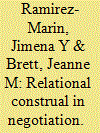| Srl | Item |
| 1 |
ID:
111476


|
|
|
|
|
| Publication |
2011.
|
| Summary/Abstract |
One of the most effective means for re-establishing trust in negotiations and disputes is by making an apology. However, the function and meaning of an apology (and thus its effectiveness for negotiators) may differ across cultures. We hypothesized that people from an individual-agency culture (such as the United States) understand apologies as analytic mechanisms for assigning blame and re-establishing personal credibility. In contrast, apologies in collective-agency cultures (such as Japan) are understood to be general expressions of remorse rather than a means to assign culpability. A survey of Japanese and Americans found that, compared to Americans, Japanese apologized more often and were more likely to apologize for actions in which they were not involved; on the other hand, Americans were more likely than Japanese to equate apologizing with personal blame. A subsequent experimental study showed that these cultural differences in the function and meaning of apologies have implications for trust repair in disputes: apologies for integrity violations led to greater trust repair for Japanese than for Americans, but apologies for competence violations were somewhat more effective for Americans than Japanese. Implications for theory and practice are discussed.
|
|
|
|
|
|
|
|
|
|
|
|
|
|
|
|
| 2 |
ID:
111475


|
|
|
|
|
| Publication |
2011.
|
| Summary/Abstract |
In certain cultures, relationships are the reason for negotiation. In this article, we offer a rationale regarding why relationships have more or less salience across cultures. We present psychological, economic and sociological factors that explain the reasons for negotiating relationally. Propositions are made as to how cultural construal about relationships influences offers, targets and limits, negotiation strategy and, ultimately, economic and relational outcomes. Our major explanatory construct is new: cultural consensus about relationships. This construct is grounded in well developed theory of self construal and new empirical research showing the utility of measures of consensus in explaining cultural differences in behavior. With this theoretical contribution, we join the group of scholars who are advocating that more attention should be paid to negotiators' subjective evaluations of the social and emotional consequences of negotiation.
|
|
|
|
|
|
|
|
|
|
|
|
|
|
|
|